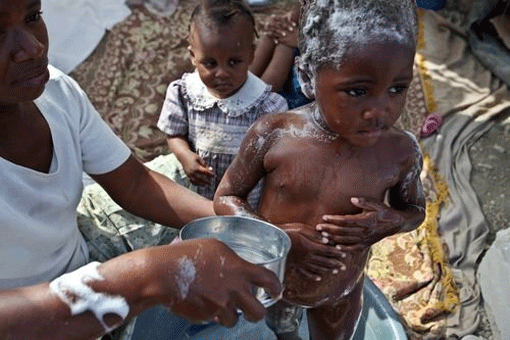Reading Time: 4 minutesWithin 18 days of the 7.0-magnitude earthquake that ravaged southern Haiti, news agencies reported that members of a U.S. Baptist Church group were arrested in the Dominican Republic for trafficking Haitian children. “This is no real surprise given history” said Kathleen Bergquist, associate professor of Social Work at the University of Nevada Las Vegas. Inevitably, during times of disaster or war, there will be individuals and groups who attempt child rescues without the appropriate paperwork or clearance. Foreigners put local children at risk through child abduction, trafficking and adoption fraud after the Asian Tsunami of 2004 and during the Darfur conflict in Sudan.
The Haiti incident recalls a similar episode in Chad when a French group called Zoe’s Ark attempted to airlift children out of a war zone. Bergquist finds the French government’s response inadequate. Since France did not hold its citizens accountable for attempted child trafficking, the illegal behaviors were ultimately dismissed, leaving no clear answer on how the actions of “humanitarians” engaged in private and illegal airlifts of children will be treated by law enforcement in the future.
Such cruel, or simply ignorant, acts will continue to occur in Haiti unless protective policies are put into place quickly.
The humanitarian response to the thousands of Haitian children who have been displaced from their families or even “orphaned” must proceed with caution. Medical evacuations from Haiti to the United States have resumed, and children are being flown in on humanitarian visas for medical care. The Shriners Hospital of Springfield, MA, is one facility receiving a small number of Haitian children. “Once these children enter into a phase of rehabilitation, they will need temporary care with families in the U.S., and we are already beginning to work on that issue,” said social worker DeGuerre Blackburn, executive director of Voices for International Development and Adoption (VIDA) and a consultant in this process. But Blackburn emphasizes that conducting DNA tests and creating a DNA databank are also necessary because eventually reuniting children with their families in Haiti is the number one priority. The DNA will help to reunite children with uncertain identities, a challenge in most post-disasters environments.
As research on adoption fraud in Guatemala has shown, a process that ensures DNA test reliability and validity will be essential to protect Haitian children. While VIDA’s ethical approach will work for a small group of children, a large-scale effort is needed for all Haitian children now arriving in the United States for medical care.
The first priority should be to identify and task an organization with a strong information management system—and no financial interest in intercountry adoption—to manage DNA matching. This could be a government organization, or even better, a reputable nongovernmental organization that can quickly and efficiently develop and implement the process. Collaborating with the private sector, which can donate the tests as a form of humanitarian disaster assistance, is also a good option.
Besides compiling a DNA database, coding the Haitian children’s visas is another protective policy that should be implemented. Currently, the number of Haitian children who will legally enter the United States under humanitarian visas for medical purposes is not being officially reported. These children could be tracked by simply marking their visas, and then using the DNA database to identify them when it is time for a visa renewal.
Regardless of how policymakers handle the early stages of a child rescue, social workers must continue to caution anyone hoping to adopt a Haitian “orphan.” Already, there are reports of scams, with families in the United States being offered the opportunity to “adopt,” and unscrupulous individuals requiring up-front fees and payments for adoption services.
Aside from the adoptions that were already being processed when the earthquake struck Haiti, there have been no new legal adoptions since. This will change in time, but in these early days social workers must caution hopeful families and, when called to assist with adoptions, only coordinate with reputable organizations. It is important to remember that not all those who call themselves “adoption professionals” have credentials and experience in child welfare placement, especially in the context of disaster.
From a psychological perspective, Saint Louis University Professor Judith Gibbons warns against further disrupting the lives of children in crisis zones. “The research literature on helping children get through crises, including war and natural disasters, suggests that they need normalization,” she said. “So, even the best intentioned shift in their environment—to different language, culture, food, or caretakers—carries with it additional stress, and a delay in psychological recovery.”
Because many Haitian children are being airlifted in this crisis, they must be treated in a culturally competent manner. Haitian social workers, who can work in the child’s language and attend to the needs that Haitians understand best from their cultural lens, should be included in the process whenever possible.
The U.S. government is now tasked with developing short-and long-term child welfare policies. Because Haiti is not a Hague Convention on Intercountry Adoption (HCIA) signatory nation, U.S. commitment to that international standard does not apply. And as Bergquist points out in an earlier article, even if the standard did apply, the HCIA has inadequate guidance for adoption in the context of natural disasters.
The Haitian disaster has forever changed the lives of an entire nation. To help its children stay together with family after receiving medical care, policies must be put in place that combine DNA tests, database management and ethical and culturally competent social work. That is how to protect Haiti’s children.
For more information about the Hague Convention on Intercountry Adoption, see the author’s website: www.HagueEvaluation.com
Learn more about Haiti Rewired, Wired.com’s new online community geared to keep Haiti in the news long after the immediate crisis ends.
ABOUT THE AUTHOR
Reading Time: 4 minutesKaren Smith Rotabi is an assistant professor at the Virgina Commonwealth University School of Social Work and a Hague Evaluator for the Council on Accreditation of inter-country adoption agencies.
Like what you've read?
Subscribe to AQ for more.
Any opinions expressed in this piece do not necessarily reflect those of Americas Quarterly or its publishers.





